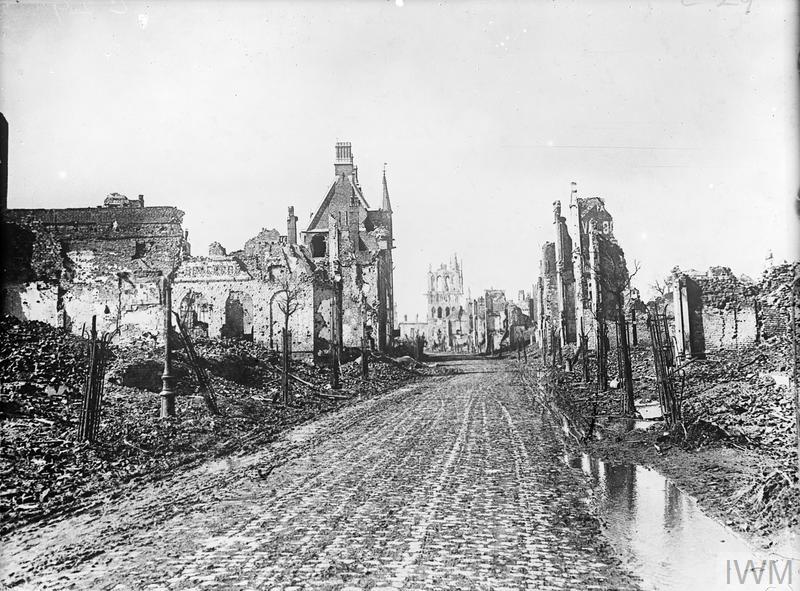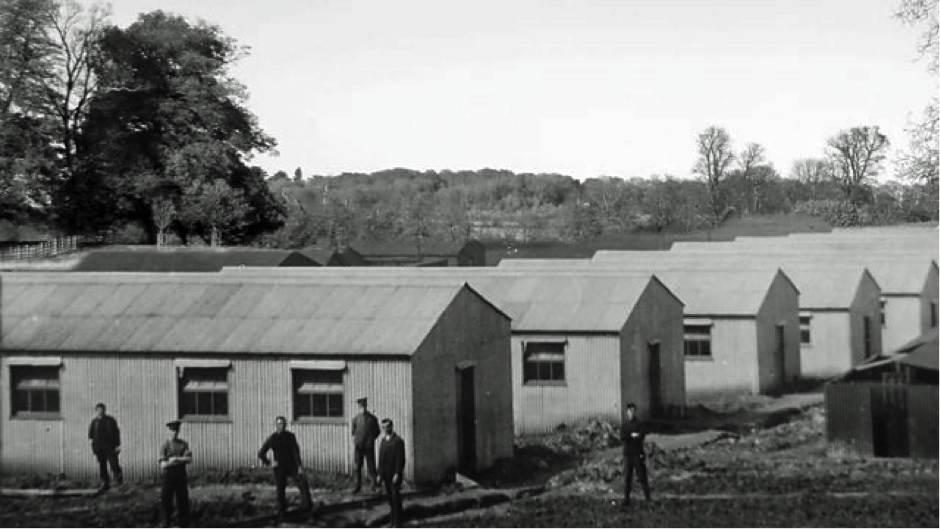A Personal Account of World War I
by G. V. Elwin
Chapter 4
From Ypres to England: 1918 – 1919
I can’t remember much about the actual move but we arrived in a position just behind Ypres, the most destroyed Belgian town with its lovely cathedral and famous Cloth Hall now both half destroyed by German gunfire. It was the best position we had for a year or two. Six guns in line covered with camouflage netting and sandbagged living dug-outs at the side of the guns for the crews. So easy too for we signallers, just two main telephone lines to maintain, one to the Observation Post and one back to brigade headquarters. To reach our O.P. we had to walk up the main road to Ypres, go round Hellfire Corner, past the half-ruined cathedral and Cloth Hall and finally to a maze of trenches called ‘The Ramparts’. From the Ramparts we had an uninterrupted view over many miles of enemy territory. Such a broad view too, miles to both left and right.
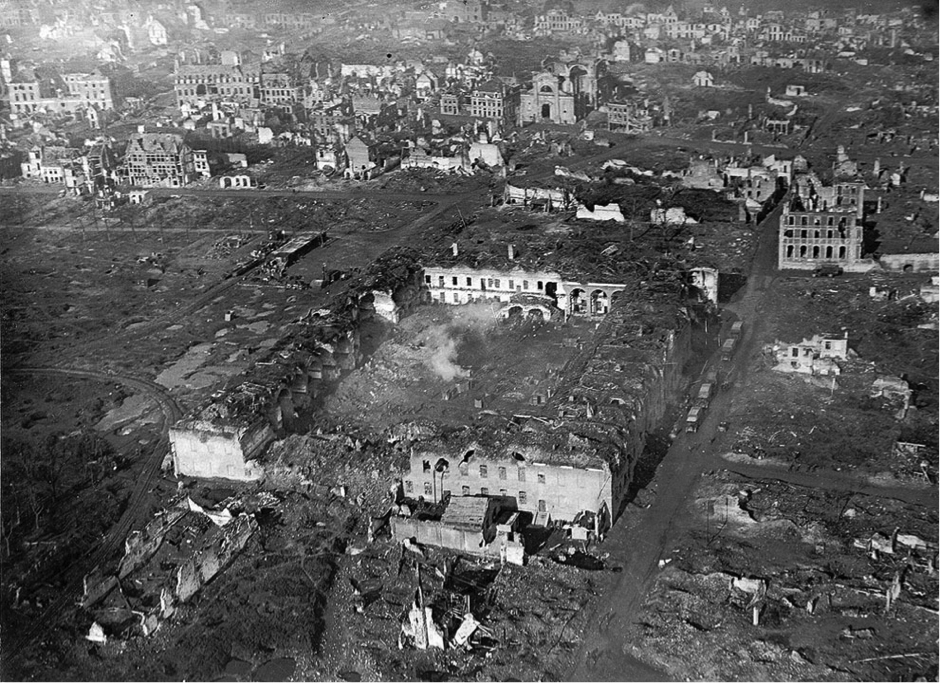
The bombarded barracks at Ypres, viewed from 500 ft.
Australian official photographs/State Library of New South Wales.
I can’t remember much about the actual move but we arrived in a position just behind Ypres, the most destroyed Belgian town with its lovely cathedral and famous Cloth Hall now both half destroyed by German gunfire. It was the best position we had for a year or two. Six guns in line covered with camouflage netting and sandbagged living dug-outs at the side of the guns for the crews. So easy too for we signallers, just two main telephone lines to maintain, one to the O.P. and one back to brigade headquarters. To reach our O.P. we had to walk up the main road to Ypres, go round Hellfire Corner, past the half-ruined cathedral and Cloth Hall and finally to a maze of trenches called ‘The Ramparts’. From the Ramparts we had an uninterrupted view over many miles of enemy territory. Such a broad view too, miles to both left and right.
The main road up to Ypres was under enemy observation for half a mile or so and to obstruct their view our Royal Engineers had erected a fifteen foot high wire netting camouflage screen. The German response was to shell the road at any odd interval day or night. Our reaction was to spend as little time as possible on this dangerous stretch of road. To this end we somehow acquired two bicycles (army ones) and rode them up and down the camouflage netting section of the road. Despite all this precaution, we were caught in German shellfire one day when coming down from the O.P. Once again I was with Jim Pearce, both of us feeling weary after being up all night, when the Germans started to shell the road in their systematic way. This way of firing was known in the artillery world as ‘sweep and search’. It really meant sweep both sides and search up and down the road.
When the shelling started on us, once again Jim Pearce pedalled furiously down the road. He could have been killed easily as the enemy would both shorten and lengthen their fire on the road. He got through safely however. For myself, reaction was as before. I rode my bicycle to the ditch at the side of the road and flung myself flat into the dry ditch and started quite automatically to pray again that I would not receive a direct hit. I was quite safe where I was from flying shell splinters. The ditch was about a couple of feet deep and dry. Soon the shelling stopped and I was on my bike quickly and pedalled furiously down the road to safety. It was a narrow squeak and it is still vividly in my memory.
Three-quarters of the way up the road we used to leave our bicycles in an old semi-demolished house until we wanted them next day or so when we returned to the battery. From there we proceeded on foot round Hellfire corner, cathedral, Cloth Hall and to the Ramparts. All very dangerous ground frequently shelled by enemy gunfire. Nothing could be done to minimise the danger; it was there all the time and so was a dreary feeling at the back of our necks.
Ypres was such a key, commanding position that the Germans had already launched three mighty assaults on the town. The separate battles for the town had already taken place and further assaults were feared. It was in this situation that we had imposed on us a strange new idea. Each time we went up to our O.P. in the Ramparts we had to strap on our backs a basket containing two carrier pigeons. Both had a basket, thus containing four pigeons. Our job was to write the whole of our night’s report on special lightweight ‘pigeon’ notepaper and release the pigeon at dawn. This went on for some weeks and then suddenly stopped. We never had to do it again.
It was about March 1918 when, to my surprise, I was suddenly promoted to corporal which meant another one shilling per day from two shillings and seven pence to three shillings and seven pence. I was surprised because my battery comprised mainly long-serving soldiers who were in the army for seven to ten years whilst I was in for the ‘duration of the war’. My work went on just the same but I did have greater responsibilities thrust upon me.
After a month or two using the Ramparts as our O.P. we were well pleased to move to another O.P. at the right of the Ramparts. Whether it was a suburb of Ypres or a small village of its own on the outskirts of Ypres, I never knew. We had still to go on our bicycles up the camouflaged road to Ypres but just before arriving we branched off to the right to Kruisstraat. At this point we left our bicycles in a derelict house until we needed them a day or two later when returning to the battery after our spell of duty at the O.P.
This O.P. was unique and was something I had never experienced previously. It was a derelict house standing in a high commanding position on a hilly piece of ground. It was half-destroyed by German gunfire. No roof at all and half one side blown down. We arrived for duty in darkness. It was unapproachable in daylight. The staircase had been part-destroyed and hung precariously from its wall. In the darkness we climbed the staircase keeping close to the wall as it was wobbly and unsafe. Then into a half-destroyed bedroom, one wall blown out. The window and frame had long since vanished and our O.P. was to be one crouching below the window frame opening. We could stand up by day behind one of the walls but our observation work was all done sitting or kneeling down.
It was whilst at Kruisstraat that I first met American soldiers. They were in a position to our right and I had many conversations with them. They were good soldiers, well trained and equipped and most friendly in all ways. Always ready to help no matter what was required. I liked them very much, far better than the French soldiers whom I had met earlier in the war. I didn’t like them at all.
We operated at Kruisstraat for many months up and down the road, spells in the old house, repairing telephone lines, directing the fire of our guns on their targets. All routine work and all under dangerous conditions.
Return to England: July 1918
It was now about June 1918 and one day whilst I was down at the battery, Sergeant Kent stopped me and said; “The C.O. wants to see you.” I said: “Now?” He said: ‘Yes, at once.” Now for the commanding officer wanting to see me seemed to suggest to my bewildered mind that it must be something serious. It was. I went and stood before him, saluted and said: “You wanted to see me, sir?” He said: “Yes Elwin, I am going to send you to England to be trained as an artillery officer.” I was flabbergasted, but just said: “Yes, sir.”
He went on to say that I would want to discuss it with my brother, told me to do so then report my decision to Sergeant Kent. If I agreed to go, arrangements would then be made forthwith. The reason for the consultation with my brother was because the major was not allowed to part brothers without their consent. I went to see my brother Harry and told him what had occurred. He said at once: “Go home. It will at least relieve our parents of 50% of their worry.” So I told Sergeant Kent I would go to England to be trained as an artillery officer.
So about July 1918 I left all my close friends of some three years and went to England. It was a sad parting. We had all shared so many dangers, so many hardships. They all envied me of course. I shook hands with all of them, some twenty to twenty-four good experienced signallers. I never saw any of them again. They passed out of my life completely.
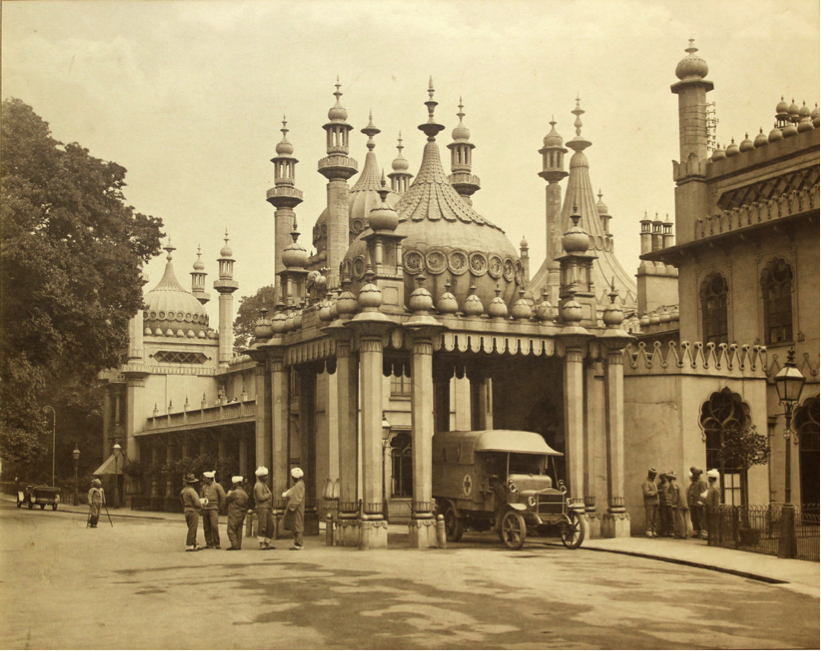
Brighton Pavilion was converted in 1914 to a war hospital for Indian Army servicemen on the Western Front.
After 1916, when the Indian Army was deployed to the Middle East, it became a hospital for limbless servicemen.
Photograph courtesy of Brighton Museums.
Why I was chosen as the only one out of all the battery to be recommended for training as an officer, I just don’t know. I was as good as anyone else at my job – better than some I suppose – but perhaps the key was that I was better educated than any of the others.
I can’t remember much of the journey home. There was no permission to go home on leave for a week which I would have welcomed. I walked to the Railway Transport Office at the railhead, took the train to Le Havre, thence to Southampton. Then on again to report to my destination: Preston Park Barracks, Brighton, Sussex. Although I had not been allowed to first go home, naturally my parents were delighted at what had happened to me. And so after three years of danger and hardship in France, I returned to peaceful surroundings. I had spent those three years watching for enemy activity, reporting the effects of our gunfire and generally keeping an eye on German occupied territory. All that was now thrust into the background and was no longer relevant.
On arriving at Preston Park, I found about thirty men collected from everywhere and anywhere to form a unit for training as artillery officers. There were only three or four like myself with service in France. The bulk was made up of men who had never been to France but had only served in administrative jobs in England. Astonishingly there were even seven Canadian raw recruits who had only been in the British Army for a few weeks. Such was the mixed band I joined at Brighton, with me a tough hardened soldier of three years battle experience. Naturally I was questioned about my experiences.
I slipped easily into my new mode of life. The great relief was that the nights were undisturbed. Lights out at 10 p.m., reveille at 6 a.m. Regardless of past training and actual experiences, we all had to do the same training. For instance I had to go through all the rigmarole of riding school, passing out after many weeks as a good rider of horses, all despite the fact that I had previously, at Charlton Park, gone through the riding school and had been duly passed out as a good rider. I had to look after horses again, to my regret. I had previously had my fill of horses at Charlton Park three years earlier.
I was shown how to load and fire an 18-pounder gun. Nothing new about that as I had done it many times in France. There were parades, horse grooming, physical exercises at 6 a.m. in semi-darkness, also lectures on how to line up guns on targets. All of this was easy to me and I passed all the exams easily.
One new item to me was revolver practice. As an ordinary soldier I had been instructed on how to handle a rifle, but revolvers were used solely by the officers. I was rather good with a revolver and soon passed out at target practice.
Exercising the horses every morning was a very pleasing experience for me but not for some of the new recruits. It should be noted here that the horses I was now riding were of the light hunting type and could be galloped and trotted at will. This compared with the heavy draft type at Charlton Park which were only allowed to be walked. Of course in the riding school at Charlton Park we had light trotting horses on which to take our riding lessons.
At Brighton we walked the horses along the road until clear of the town, then branched off down a deep cleft in the ground. It was so steep down this cleft that the horses went down sideways. Going down I would be lying back almost touching my back at the horse’s tail. The next moment as we climbed out my nose was almost between the horse’s ears. It was most exciting. The riding scheme instructor (army team rough rider) would be leading and would at once break into a gallop and streak away. As we climbed out of the cleft all the other horses, one by one, would tear after the leader at full gallop. This gallop took place on grassland adjoining Brighton racecourse. It was most exciting to me, but not so for some of the newcomers.
All this training was suddenly and finally disrupted by the declaration of the Armistice at the 11th hour of the 11th day of the 11th month in the year 1918. From then on training ceased but the horses still had to be cared for. Everyone was anxious to go home. We had enlisted in the King’s army for the ‘duration of the war’ so the war now being over, we had the right to go home. Feelings ran high, some talked of walking out and in fact there were many desertions up and down the country. For instance, my brother Harry was home on leave on the 11th November and he never returned to his unit in France. He was never officially demobilised.
Desertions were so widespread that the authorities just let it take place. The soldiers were in the right. They had joined for the duration of the war and the war was over. They had lived in dreadful conditions, highly dangerous all the time and they wanted no more. So they walked out in thousands. It was all hushed up by the authorities but it happened.
Photograph courtesy of BBC
We at Brighton decided that, as most of us had been fortunate enough to survive the war, it would be foolish to do anything that might delay our routine demobilisation whenever it came. So we quietly went on with our duties. Then in mid-January 1919 we were suddenly given our demobilisation papers plus rail tickets to take each of us to the nearest centre for demobilisation to our homes. My tickets took me to Belton Park, Grantham, about eighteen miles from my home village of Radcliffe on Trent. I can’t remember if we slept overnight at Belton Park. I suppose we must have done as I recollect throwing my pay book onto a growing pile on the floor as we passed through a long room.
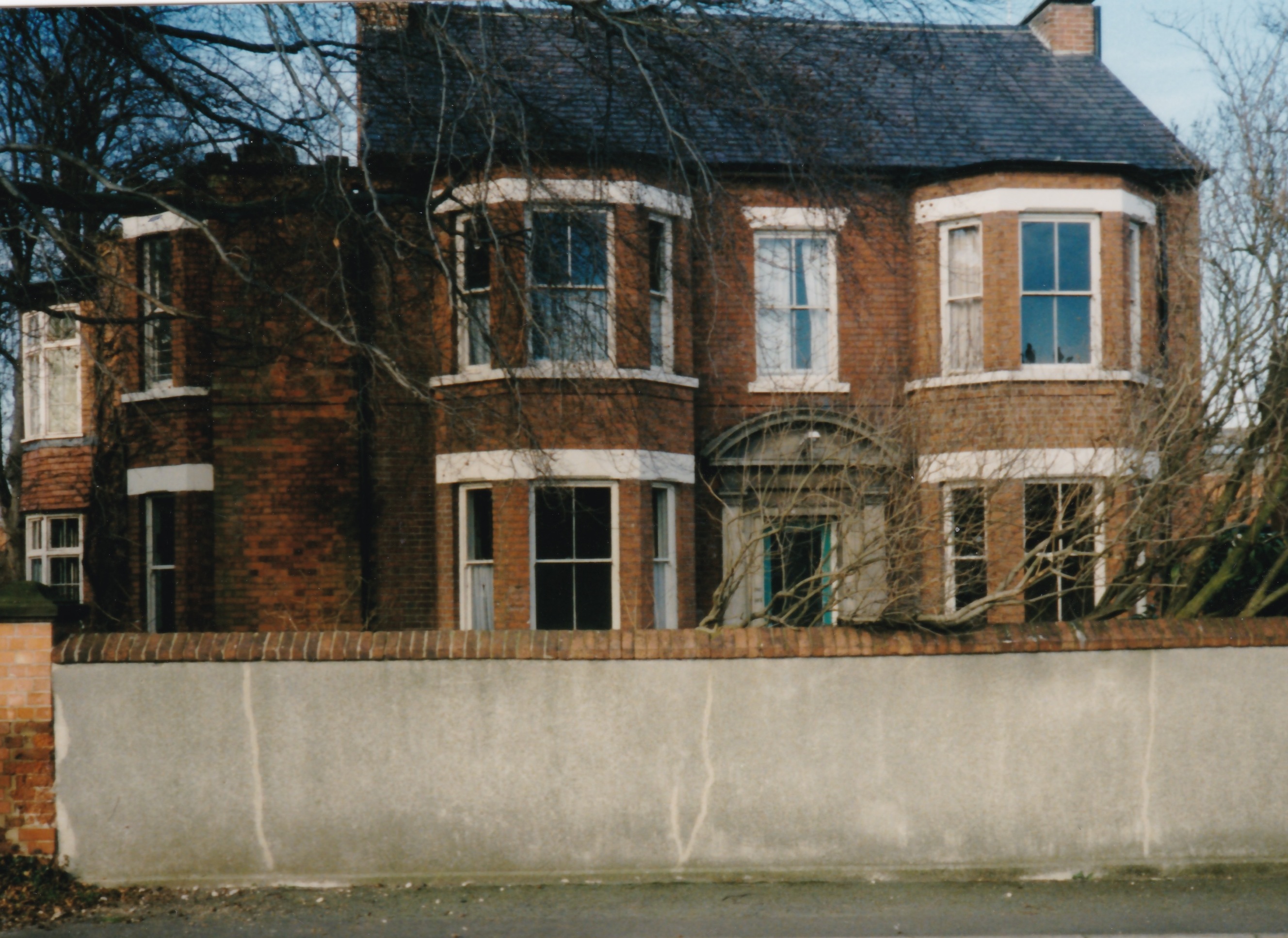
Brick House, Radcliffe on Trent, early home of Elwin family
We were fitted out with a ‘demob’ suit, new underclothes, socks and new boots. The same day I went home to Radcliffe on Trent, still in my army uniform and my civilian clothes in a bundle under my arm. A day or two later I burnt my uniform although as soon as I arrived home I stripped off all my army clothes in my father’s greenhouse and went into my house to the bathroom and had a luxurious hot bath.
So ended my army career after considerable dangers and four years and two months of service for King and Country. Now at the age of nearly ninety-eight years I think and ponder on the many times I could have been killed. Just pure luck I suppose, or was it divine protection? I know at times I prayed hard.
Appendix
Incidents seen and experienced but not mentioned in my narrative
A low flying German aircraft flying along a road: machine-gunning the road as he flew on, bullets spattering down the road. I was standing behind a half-broken down telegraph pole firing at the aircraft with tracer (visible) bullets from my rifle as he passed overhead.
The incessant whine of German machine-gun bullets sweeping along the top of our trenches, ending in a ping or a plop as they hit the ground.
Observation balloons were strung along behind the German trenches and also behind our line of trenches. Attacks on them at dawn by aircraft were quite common. When attacked, the one or two occupants in the balloon baskets would at once jump out and float down by parachute to the ground, sometimes machine-gunned and killed by the aircraft when halfway down. It was a pitiless war.
I saw one attack on a Belgian balloon when the occupant’s parachute failed to open and he dropped to the ground like a stone, his parachute just fluttering. No doubt he was killed instantly.
On another occasion I saw at dawn an English aircraft fly along a line of German balloons and shoot down six, one after the other, leaving a line of smoke pillars in the sky. A devastating attack!
At Martinsart, a battery of 8 inch howitzers were in position about 300 yards to our rear. We used to watch their shells soar into the sky until they disappeared out of sight over our heads. A howitzer fires its shells through a high trajectory and at lower speed than a gun.
A gun shell travels quicker than sound and would be bursting near you before you heard the sound of its flight through the air. Our 60-pounder guns were particularly hated by the Germans for this reason. A howitzer shell travels more slowly than sound and so you can hear them coming. Quite a difference when you are on the receiving end.
I saw hundreds of dead and wounded men, scores and scores of dead horses and mules, many many overturned gun limbers, water carts, ammunition limbers, half destroyed villages; these latter just piles of bricks and broken wood.
Finally my pay at demobilisation was a magnificent three shillings and seven pence per day and I received a war gratuity of £18 for over four years’ service.
Gilbert Vernon Elwin, Spring 1993
Please note that we do not give permission for wholesale copying of all or parts of A Personal Account of World War 1 by G.V. Elwin and in no case would we consider more than a page to be fair use. We do not give permission for Elwin’s book to be imported to other websites, published elsewhere or reproduced in different formats such as films, documentaries or plays.
Copyright © University of the Third Age, Radcliffe on Trent

